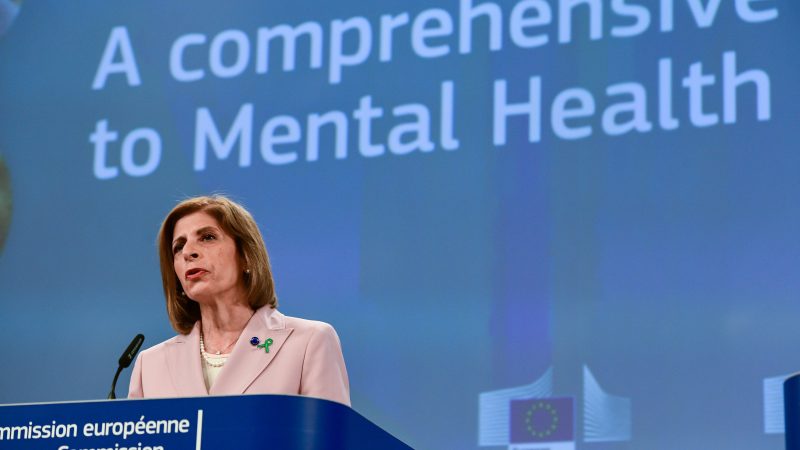On the occasion of the conference organized by the European Commission as part of World Mental Health Day, the European Commissioner for Health, Stella Kyriakides, presents the executive’s initiatives in this area in a column for Euractiv.
Stella Kyriakides is the European Commissioner in charge of Health and Food Safety.
There is no health without mental health. This may seem simple, but implementing this principle is much more complex than it seems.
As a clinical psychologist, and having worked for many years at the intersection between physical health and mental health, I am well aware of the important role that our mental well-being plays on our physical health.
Throughout my political career, I have tirelessly advocated for mental health issues to become a public health priority.
The data we have shows how recent events, such as the Covid pandemic, geopolitical crises, digitalization, the increase in the cost of living and even eco-anxiety have exacerbated mental health problems in the European Union .
Nearly one in two Europeans have experienced an emotional or psychosocial problem, such as feeling depressed or anxious, in the last twelve months, and one in four Europeans say they feel exhausted.
Millions of European citizens today face mental health problems and suffer from depression, anxiety, fears or worries, low self-esteem or other problems that affect their lives daily in a negative way.
Furthermore, alarming statistics show that the number of children and adolescents suffering from depression has doubled since the start of the pandemic. Suicide is now the second leading cause of premature death among young people.
Our younger generations are our future, they should be filled with joy, excitement and hope about what awaits them and the life they have left to live.
It is high time to change course and make mental health a priority on the political agenda.
Recent years have taught us that we can do much more for the health of our fellow citizens when we work together. This is the fundamental principle of the European Health Union that we are building.
In this Union, everyone will work together to improve the prevention, treatment and care of citizens and diseases such as cancer, and one of the main priorities will be to collectively guarantee robust and healthy health systems. Access to quality care and medicines at affordable prices for everyone, regardless of their place of residence.
Ending stigma, making mental health care accessible to our communities and acting collectively for every citizen living with mental health problems must be at the heart of the European Union’s action.
Today, more than 50% of European citizens suffering from mental health problems have not received professional help. This situation can not continue.
With the first ever EU mental health strategy, we have taken an important step to address these issues and put mental health on an equal footing with physical health.
Looking back, we can say that 2023 is the year we opened a new era for our collective engagement and encouraged open dialogue towards a society where we say “I’m not okay, and that’s not okay.” serious” is as normal as talking about a broken leg or a fever.
Our new approach essentially consists of no longer considering mental health from a single angle, whether economic, social or health, but of providing a global response that affects all aspects of society and extends to all areas of life. ‘action.
With Member States, we favor action that touches all policy areas, from education and employment to digitalization and culture, and that intervenes at all stages of mental health, prevention and initial detection to reintegration and quality of life.
With 20 flagship actions and more than €1.2 billion in funding, we are launching, in collaboration with Member States and industry stakeholders, actions to support children’s and youth’s mental health networks. young people, and to protect them in the digital sphere.
We are also working on a European initiative to prevent depression and suicide, on a European mental health code and on the training of health professionals.
With a European initiative on work-related psychosocial risks and EU-wide workplace awareness campaigns, we will also contribute to solve problems related to the world of work. These are just some of the many actions we will be implementing in the months and years to come.
This article is originally published on euractiv.fr









